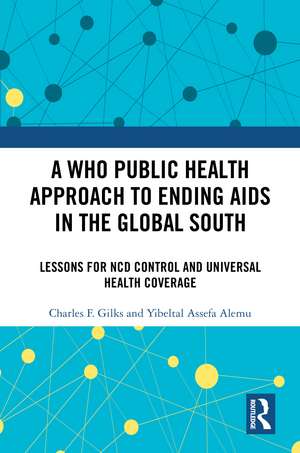A WHO Public Health Approach to Ending AIDS in the Global South: Lessons for NCD Control and Universal Health Coverage
Autor Charles F. Gilks, Yibeltal Assefa Alemuen Limba Engleză Hardback – 22 iul 2024
The first section of the book provides a detailed overview of the strategy that enabled such a successful programme to be taken place, the challenges faced and its evolution over time. The book then moves on to assert that by approaching other chronic NCDs in a similar way, focussing on populations with integrated long-term and short-term person-centred care, there is a pathway towards universal health care and Universal Health Coverage across the developing world.
Discussing many of the most pressing diseases and public health issues affecting these regions, this book provides global health scholars and practitioners with a detailed analysis of the challenges faced in tackling these diseases, but also an integrated person-centred health-care approach by which these challenges may be met.
Preț: 1097.96 lei
Preț vechi: 1155.76 lei
-5% Nou
Puncte Express: 1647
Preț estimativ în valută:
210.10€ • 228.34$ • 176.29£
210.10€ • 228.34$ • 176.29£
Carte tipărită la comandă
Livrare economică 25 aprilie-09 mai
Preluare comenzi: 021 569.72.76
Specificații
ISBN-13: 9781032342337
ISBN-10: 1032342331
Pagini: 252
Ilustrații: 18
Dimensiuni: 152 x 229 mm
Greutate: 0.51 kg
Ediția:1
Editura: Taylor & Francis
Colecția Routledge
Locul publicării:Oxford, United Kingdom
ISBN-10: 1032342331
Pagini: 252
Ilustrații: 18
Dimensiuni: 152 x 229 mm
Greutate: 0.51 kg
Ediția:1
Editura: Taylor & Francis
Colecția Routledge
Locul publicării:Oxford, United Kingdom
Public țintă
Postgraduate and Professional ReferenceCuprins
Introduction
Section 1: The WHO Public Health Approach to HIV/AIDS in the Global South
1: Recognising and addressing inequity in the global HIV/AIDS response
2: “3by5” - coming to grips with the AIDS treatment gap
3: Unpacking the WHO Public Health Approach to ART
4: Keeping the Public Health Approach fit for purpose
5: Ending AIDS and planning for Endemic HIV
Section 1: Bibliography
Section 2: A Public Health Approach for NCD control in the Global South
6: Chronic non-communicable diseases as a global public health challenge
7: Unpacking the chronic non-communicable diseases agenda
8: The NCDs: increasingly important, still neglected and in crisis
9: A public health approach to scale up NCD control interventions
Section 2: Bibliography
Section 3: Delivering Universal Health Coverage in the global south
10: Health and the Universal Health Coverage agenda
11: Strategies for achieving Universal Health Coverage
12: Progress and challenges for Universal Health Coverage
13: The Public Health Approaches towards Universal Health Coverage
Section 3 Bibliography
Conclusion
Section 1: The WHO Public Health Approach to HIV/AIDS in the Global South
1: Recognising and addressing inequity in the global HIV/AIDS response
2: “3by5” - coming to grips with the AIDS treatment gap
3: Unpacking the WHO Public Health Approach to ART
4: Keeping the Public Health Approach fit for purpose
5: Ending AIDS and planning for Endemic HIV
Section 1: Bibliography
Section 2: A Public Health Approach for NCD control in the Global South
6: Chronic non-communicable diseases as a global public health challenge
7: Unpacking the chronic non-communicable diseases agenda
8: The NCDs: increasingly important, still neglected and in crisis
9: A public health approach to scale up NCD control interventions
Section 2: Bibliography
Section 3: Delivering Universal Health Coverage in the global south
10: Health and the Universal Health Coverage agenda
11: Strategies for achieving Universal Health Coverage
12: Progress and challenges for Universal Health Coverage
13: The Public Health Approaches towards Universal Health Coverage
Section 3 Bibliography
Conclusion
Notă biografică
Charles F. Gilks holds the inaugural Queensland Professorial Chair in Blood-borne Viruses and STIs at the University of Queensland (UQ). He is a global health specialist and clinical academic. A UK graduate, he started working on HIV/AIDS in East Africa in 1988, based in Nairobi at the Kenya Medical Research Institute. He became the Professor of Tropical Medicine at the Liverpool School of Tropical Medicine in 1994 before moving to WHO in 2001 to head up HIV treatment and prevention scale-up and to drive “3by5” roll out. He was appointed UNAIDS Country Coordinator in India in 2009 and moved to Australia in 2013 to become Dean and Head of the School of Public Health at UQ.
Yibeltal Assefa Alemu is an Associate Professor in Global Health Systems at the School of Public Health, the University of Queensland. He has played key roles in developing national and global guidelines and contributed to health systems strengthening and universal health coverage in Ethiopia and other resource-limited settings. He has held influential positions in Ethiopia, including Deputy Director General of the Ethiopian Public Health Institute, Executive Director of the International Institute for Primary Health Care, Director of Medical Services at the Federal Ministry of Health, Director of Planning, Monitoring and Evaluation as well as Head of Health Programs at the Federal HIV/AIDS Prevention and Control Office.
Yibeltal Assefa Alemu is an Associate Professor in Global Health Systems at the School of Public Health, the University of Queensland. He has played key roles in developing national and global guidelines and contributed to health systems strengthening and universal health coverage in Ethiopia and other resource-limited settings. He has held influential positions in Ethiopia, including Deputy Director General of the Ethiopian Public Health Institute, Executive Director of the International Institute for Primary Health Care, Director of Medical Services at the Federal Ministry of Health, Director of Planning, Monitoring and Evaluation as well as Head of Health Programs at the Federal HIV/AIDS Prevention and Control Office.
Descriere
In highlighting how a Public Health Approach (PHA) has been successfully used in developing countries to provide HIV/AIDS patients with antiretroviral therapy (ART), this important book provides a template for how the PHA can be implemented to treat other chronic diseases as well.
